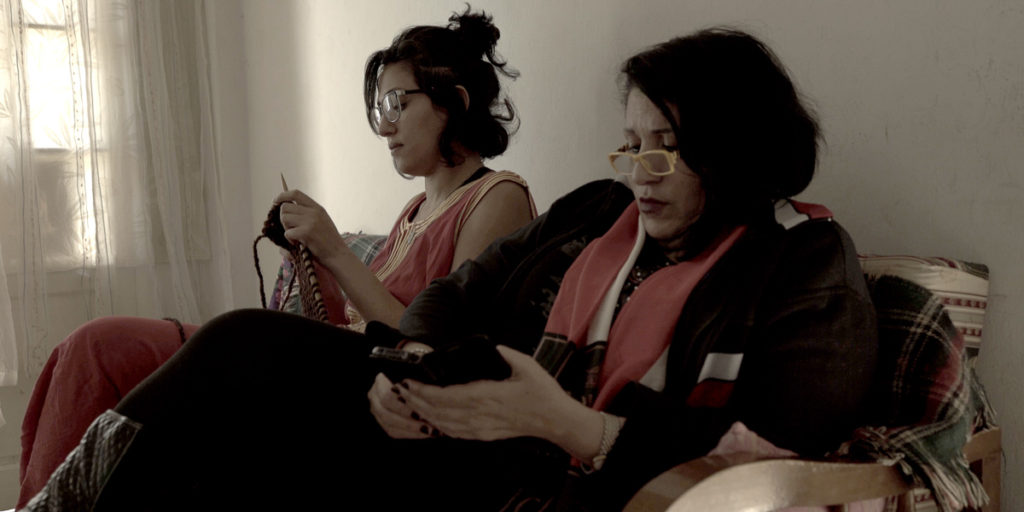Lina Alabed’s senior project, a documentary about author Mohamed Al-Maghout, was broadcast on Al Jazeera in 2007. Her first documentary short, “Noor Alhuda,” won the DOX BOX jury prize at the DOX BOX International Documentary Film Festival for Best Syrian Documentary in 2010. Her second short later won Best Documentary Film at the Arab Short Festival. In addition to directing, she also produced her first feature documentary, 2012’s “Damascus, My First Kiss.” “Ibrahim: A Fate Defined” is her feature-length followup.
“Ibrahim: A Fate to Define” will premiere at the 2019 Toronto International Film Festival on September 11.
W&H: Describe the film for us in your own words.
LA: A personal documentary following my quest to define my identity by tracing the circumstances surrounding the disappearance of my father, Ibrahim.
W&H: What drew you to this story?
LA: I grew up holding my father’s story. I was not sure if I wanted to do this film until 2012, when I got my first-ever entry permit to Palestine.
I went to Deir Abu Mishal, my father’s native village, near Ramallah. For nine days, I met and stayed with some of his family members still living there.
This experience was magical enough to relieve the “refugee” feeling I carried my entire life. It also left me with fresh and new layers of questions about my self-identity.
W&H: What do you want people to think about when they are leaving the theater?
LA: By sharing my personal and intimate journey with other people, I would like to make them think about their own lives, choices, and even traumas.
I would like to make them feel that there is nothing as relieving as telling our story by ourselves. Telling our stories and traumas to others helps us look at the past in a more objective, and less emotional, way.
W&H: What was the biggest challenge in making the film?
LA: The biggest challenge was to convince my family, and the friends of my father, to look again into the past.
Even for me, as someone who decided to make this journey, there were moments when I was so afraid to go ahead because it meant facing the nightmares and monsters that have been haunting me my whole life.
W&H: How did you get your film funded? Share some insights into how you got the film made.
LA: I started this film in the end of 2012 with [writer/producer] Rami Nihawi and Sakado LTD. Later on, we were lucky to have other partners as co-producers through a network of friends who work in films in different countries.
Moreover, we have been applying for different regional and international funds.
We attended many platforms for post-production, and we received support, as well to be able to finish the film.
W&H: What inspired you to become a filmmaker?
LA: There was no institute or university in Damascus for studying cinema, so I graduated from journalism at the University of Damascus with a focus on documentary film about the Syrian author Mohamad Al Maghout.
After completing this first project, I understood that making films is the most interesting and enjoyable way of expressing myself.
I love telling and sharing stories, and I do it best by being a filmmaker.
W&H: What’s the best and worst advice you’ve received?
LA: There were many people, including my mother, who advised me against making the film. The friends of Ibrahim were particularly strong with the same advice, telling me that I would not be able to ever know what really happened to my father.
I got good advice from Nihawi as a co-writer, not as a producer when I was struggling with the fact that I will never know what really happened. He reminded me again that it is all about the journey itself, not about the result or end of the journey.
W&H: What advice do you have for other female directors?
LA: For me, I am still learning how to developt my visual language. In my opinion, as an independent filmmaker, patience, courage, and determination are very important elements in order to be able to finish any challenging project.
The advice I would give, especially to women filmmakers, is to express themselves and to do what they want without thinking what others will think.
W&H: Name your favorite woman-directed film and why.
LA: I like Jacqueline Zünd’s films, especially her documentary “Goodnight Nobody.”
The visual language is very touching. The way she presents the basic emotions and feelings of different human beings is at the same time extremely simple and incredibly strong.
W&H: What differences have you noticed in the industry since the #MeToo and #TimesUp movements launched?
LA: The #MeToo and #TimesUp movements are very important events that are helping shape our societies in a better way.
However, it opened a window on a reality that goes behind and beyond the film industry and it is a characteristic of our patriarchal society.
It is part of a struggle that has started long time ago, and that we need to continue in every aspect of our society and lives.







